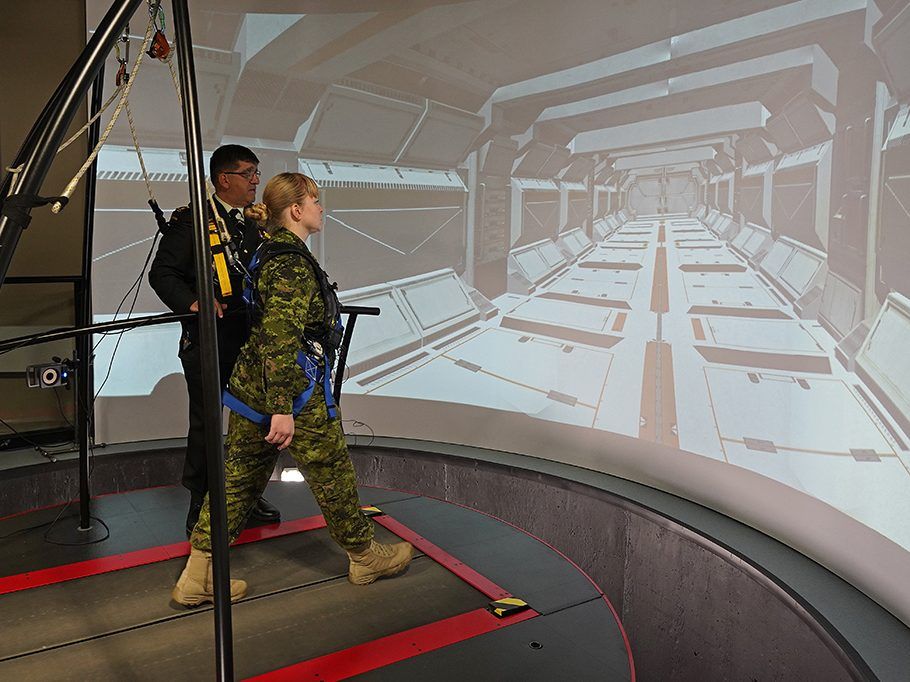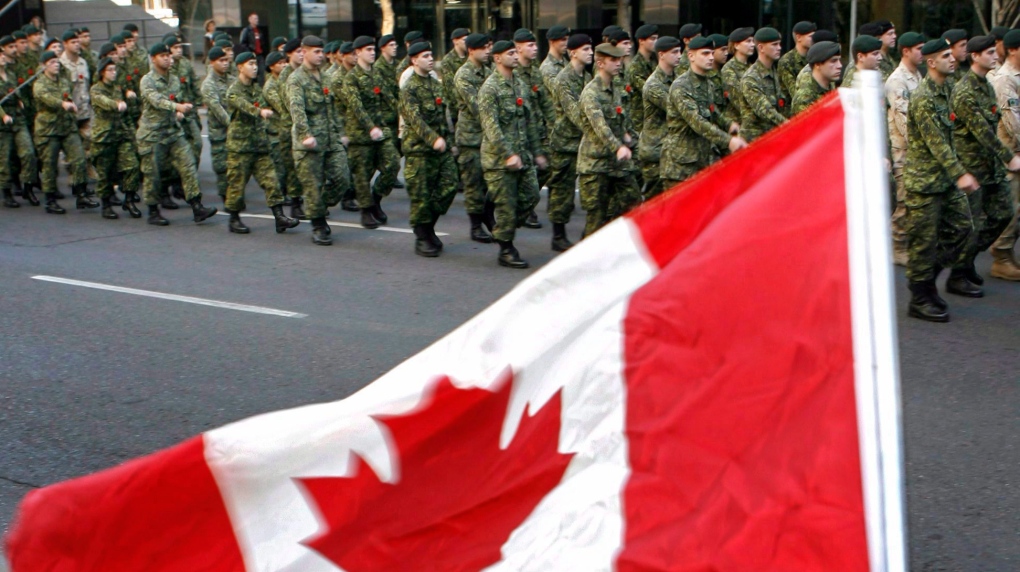Heroes in Mind
2 posters
Page 1 of 1
 Heroes in Mind
Heroes in Mind
Group offers virtual-reality PTSD treatment for military members
Nicole Bergot
Published:
February 13, 2019
Nicole Bergot
Published:
February 13, 2019

Col. Rakesh Jetly (chief pyschiatrist, Canadian Armed Forces) demonstrates the 3MDR system with Capt. Anna Harpe at Glenrose Rehabilitation Hospital in Edmonton on Wednesday Feb. 13, 2019.
Virtual reality to help more military and other public safety workers cope with PTSD is central to the work of a new group launched in Edmonton.
Heroes in Mind, Advocacy & Research Consortium (HiMARC) is made up of those who want “to serve the men and women in uniform who have served us and continue to serve us daily,” Bob Haennel, dean of the University of Alberta’s Faculty of Rehabilitation Medicine, said in a Wednesday news release.
HiMARC’s Motion-Assisted, Multi-Modal Memory Desensitization and Reconsolidation (3MDR) research study — the largest of its kind in Canada with 40 Armed Forces participants — allows PTSD patients to use the Computer-Assisted Rehabilitation Environment (CAREN) system at the Glenrose Rehabilitation Hospital.
“It was incredible. I don’t know how else to describe it. My senses were heightened. I was even sensitive to the clanging sound of the carabiner on my harness,” said Capt. Anna Harpe, a social worker at CFB Edmonton, after experiencing the 3MDR system.
Patients who step into the CAREN unit walk on a treadmill toward a stimulus, sounds and images that may remind them of events that trigger traumatic memories. A therapist is with them through the process, guiding the patient confronting the memories.
While Harpe does not have PTSD, she said testing the 3MDR brought back vivid recollections of a mission in Afghanistan when she was in the infantry.
“I have worked with some clients who have been diagnosed with PTSD, and I have to say, the 3MDR is mind-blowing. My whole body was activated. You just cannot get the same thing through talk therapy in an office,” she said.
Study participants are receiving the therapy once a week for six weeks.
“By walking towards the fear, there is a shift in the brain,” said Suzette Brémault-Phillips, director of HiMARC in the Faculty of Rehabilitation Medicine and co-principal investigator for the study in Canada.
The 3MDR system — developed by Col. Eric Vermetten, head of research at the Military Mental Health unit of the Dutch ministry of defence in the Netherlands — has been effective in the Netherlands where it’s been used to treat the rise in PTSD cases there after its mission to Afghanistan.
Vermetten traveled to Edmonton to train Brémault-Phillips and her team to use the system.
HiMARC’s founding members also include the Royal Canadian Legion Alberta – NWT Command, NAIT, the Department of National Defence, Veteran Affairs Canada and Covenant Health.
“HiMARC is creating hope and I am so grateful for this group. I really believe this is just the beginning,” added Harpe.

Jeremiah- Registered User
- Posts : 307
Join date : 2018-02-23
 Re: Heroes in Mind
Re: Heroes in Mind
University of Alberta program receives $3 million for PTSD treatment and research
The Canadian Press
Published April 21, 2023

The Alberta government is investing more than $3 million to focus on rehabilitation and research for military veterans with post-traumatic stress disorder.
Advanced Education Minister Demetrios Nicolaides says the money will support the Heroes in Mind, Advocacy and Research Consortium program at the University of Alberta.
The group supports military members, veterans, public safety personnel and others who suffer from PTSD through new and innovative treatment options.
Nicolaides says the support is necessary because too often Canada’s soldiers leave their service with mental scars.
The director of the consortium says it uses a structured, repetitive, psychotherapeutic process which involves the patient walking on a treadmill where they relive traumatic events through virtual reality.
She says while doing so, they are helped by a therapist by their side.
This report by The Canadian Press was first published April 21, 2023.

Oliver- Benefits Coordinator
- Posts : 226
Join date : 2018-02-28
 Similar topics
Similar topics» Wounded Heroes
» HEROES MENDING ON THE FLY CANADA
» Homes for Heroes Foundation
» Broken Heroes - Fighting PTSD in the Canadian Forces
» Veterans help clean up the Highway of Heroes
» HEROES MENDING ON THE FLY CANADA
» Homes for Heroes Foundation
» Broken Heroes - Fighting PTSD in the Canadian Forces
» Veterans help clean up the Highway of Heroes
Page 1 of 1
Permissions in this forum:
You cannot reply to topics in this forum|
|
|

 Home
Home

